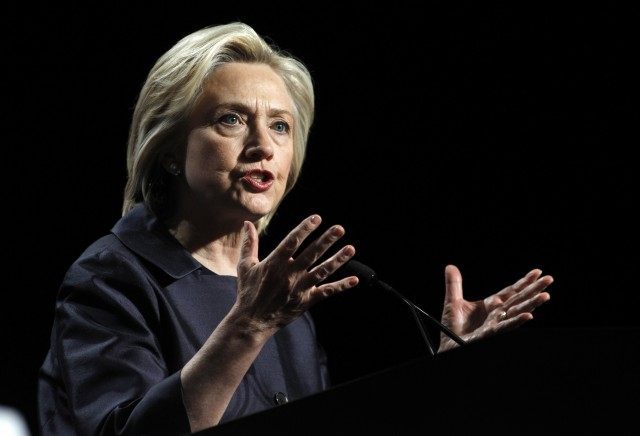FLORISSANT, Mo. (AP) — Hillary Rodham Clinton says the Confederate flag “shouldn’t fly anywhere.”
The Democratic presidential contender calls the deadly shootings of nine black church members in South Carolina “an act of racist terrorism perpetrated in a house of God.”
She’s welcomed news that South Carolina Gov. Nikki Haley and legislators are working to remove the Confederate battle flag from the grounds of the South Carolina Statehouse.
Clinton addressed church members Tuesday in suburban St. Louis, near the epicenter of violent protests that occurred in Ferguson, Missouri, after the August death of Michael Brown.
She called the Confederate flag a symbol of the nation’s racist past that should have “no place” in the country’s present or future.
THIS IS A BREAKING NEWS UPDATE. Check back soon for further information. AP’s earlier story is below.
Hillary Rodham Clinton is putting America’s struggle with race relations at the forefront of her presidential campaign, joining with church members near the epicenter of violent protests in Ferguson, Missouri, as the nation grapples with the deadly shootings of nine black church members in South Carolina.
The leading Democratic presidential contender plans to attend a community meeting Tuesday at a church in Florissant, Missouri, a short drive from the site of the unrest in Ferguson after the August death of Michael Brown, a black, unarmed 18-year-old, who was shot by white Ferguson police officer Darren Wilson. Brown’s death spurred outrage and led to a national “Black Lives Matter” movement demanding changes in how police deal with minorities.
The former secretary of state planned to talk about ways to turn grief, anger and despair into purpose and action in communities that have faced racial divisions, her campaign said. Clinton was initially scheduled to discuss economic issues at her stop in Missouri. But after the Charleston shooting, she called staff and said that she wanted to hold the event in a church and discuss race.
Clinton largely avoided giving race relations a prominent place in her 2008 Democratic campaign against Barack Obama, who was vying to become the nation’s first black president at the time. Yet she’s leaned into a number of issues closely watched by African-Americans this time, discussing the need to change the criminal justice system, improving access to voting and helping minority small business owners.
Clinton’s campaign hopes to mobilize black voters in large numbers in the 2016 election, building upon the coalition of minority, young and liberal voters who powered Obama’s two White House campaigns. The message has taken fresh urgency since last week’s church massacre in Charleston, South Carolina, which happened shortly after Clinton campaigned in the city.
“This is a time for people in the public domain and the public square to speak what they believe, not give us political talk,” said Marc Morial, the president of the National Urban League, whose organization has called for the removal of public displays of the Confederate flag. “This tragedy is a time when we get to test their convictions.”
In suburban St. Louis, Clinton’s meeting will be hosted by the Rev. Karen Anderson of Ward Chapel AME and the Rev. Traci Blackmon, pastor of Christ the King United Church of Christ in Florissant and a member of the Ferguson Commission, a panel tasked with making recommendations to address underlying social and economic issues connected to the riots.
Clinton’s campaign said the conversation will “address the massacre in Charleston and broader issues around strengthening communities.”
South Carolina’s Republican governor, Nikki Haley, announced Monday that she would seek the removal of the Confederate battle flag from the grounds of the statehouse. The 21-year-old man charged with murder in the church shootings appeared in photographs waving the Confederate flag. Clinton tweeted Monday that Haley was right to call for the “removal of a symbol of hate” in South Carolina.
In a weekend speech to U.S. mayors in San Francisco, Clinton called for “common-sense” gun law changes in the aftermath of the South Carolina shooting, and said the nation’s racial divide couldn’t be attributed to “all kooks and Klansman. It’s also in the cruel joke that goes unchallenged. It’s in the offhand comments about not wanting `those people’ in the neighborhood.”
“We can’t hide from any of these hard truths about race and justice in America,” she said. “We have to name them and own them and then change them.”
Clinton started the day at a Chicago fundraiser and planned to attend another campaign finance event in the St. Louis area after the Florissant meeting.

COMMENTS
Please let us know if you're having issues with commenting.